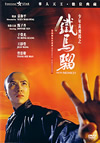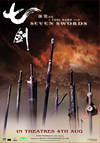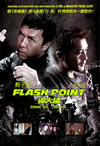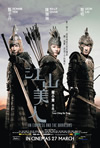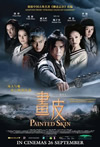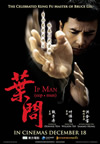|
The Legend of the Yen
Imagine that you wanted to make a movie about the legendary Wing Chun master Ip Man, or for that matter, any period martial arts movie. Who would you cast in the lead role?
Jet Li? Didn’t he say a while ago he’s not going to do kung fu movies anymore? (Besides, he’s already done Fearless, aka Huo Yuan Jia). Jackie Chan? You’ll probably want someone with more gravitas befitting the subject matter.
Inevitably, your best bet would be with Donnie Yen. Remember when kung fu movies were the fad in the early 1990s, Donnie Yen closely collaborated with choreographer Yuen Woo Ping in not just the iconic Once Upon A Time In China II, but also other cult classics such as Iron Monkey and Wing Chun.
Indeed, the 45-year old action maestro established himself very early on in his career as a talented martial artist and has not looked back ever since. Of late, he’s been enjoying somewhat of a career resurgence with Ip Man his third movie out this year (after An Empress and the Warriors and Painted Skin). You can’t say the guy isn’t hardworking, especially when you compare the number of movies he’s worked on to that of his closest peers Jackie Chan and Jet Li in recent years.
It’s high time that someone gave Donnie Yen his due credit and recognition- for he may in fact be our brightest bastion of hope for martial arts flicks these days. Here’s a look at the man behind Ip Man, arguably a legend in his own right.
An Early Start
When you look at Yen’s parentage, you’d understand why the man was so fascinated with martial arts since young. Born in Guangzhou, China, Donnie Yen was the son of Klysler Yen, a newspaper editor and Bow Sim-Mark, a famous Wushu and Tai Chi master. His mother, better known as Master Mark, was one of the first to teach Wushu in the West and specializes in the Wudang Sword routine, a student herself of the great Fu Wing Fay.
Yen’s biography says that his mother began training him in martial arts as soon as he could walk. He moved to Hong Kong when he was two and later to Boston at the age of eleven. In the streets of Boston’s Chinatown, Yen became entranced by the kung fu movies of Ti Lung, Bruce Lee and Jackie Chan. After watching his idols on screen, he showed an impressive ability to imitate their moves in real life.
But being the rebellious teenager he was then, he often skipped school and soon dropped out. Worried that he may fall into bad company, his parents sent him to join the famed Beijing Wushu team when he was 16 and Yen spent the next two years training under the same master as Jet Li. En route back to the United States, Yen stopped over in Hong Kong and met Yuen Woo-Ping for the first time.
Opportunity Knocked
This propitious meeting was to mark the start of Yen’s illustrious film career in the 1990s. He made his feature film debut in Drunken Tai Chi in 1984 at the age of 21. Just four years later, he served as action director for Tiger Cage and its sequel, displaying his flexibility with Western kickboxing.
But Yen’s big break came with his role as General Lan in Once Upon A Time In China II. The climactic fight between his character and Jet Li’s Wong Fei Hung is regarded as one of the best martial arts duels to this day. In fact, Zhang Yimou tried to replicate the iconic pairing by once again having the duo battle each other in Hero (2003). For his performance in Once Upon A Time In China II, Yen was nominated for Best Supporting Actor at the Hong Kong Film Awards in 1992.
Yen followed his then career best performance with cult classics Iron Monkey and Iron Monkey II, best known for his staging of the Shadowless Kick. He also teamed up with Michelle Yeoh in director Yuen Woo-ping’s Wing Chun.
The Way Downhill
However, after the martial arts genre lost somewhat of its lustre during the mid 1990s, Donnie Yen went on to act, and even write and direct in many forgettable modern day action flicks such as Legend of The Wolf and Ballistic Kiss. Haven’t heard of them? That’s probably for the better.
The next few years were also at best middling for the action star, involving a Hollywood detour and forays into some mid-range works such as Blade II and other downright bottom-of-the-barrel works like Highlander: Endgame.
Perhaps then his return to Hong Kong cinema with Zhang Yimou’s Hero (2003) was a portent of better things to come. That year, he also co-starred with Jackie Chan in the Hollywood sequel Shanghai Knights (2003). His steps on a return to form for Donnie Yen also included action director for silly blatantly commercial vehicles The Twins Effect (2003) and The Twins Effect II (2004), as well as Tsui Hark’s underwhelming Seven Swords (2005).
The Comeback Kid
Hailed as a return to Hong Kong cinema classics, Sha Po Lang (2005) marked the first and the start of a fruitful collaboration with director Wilson Yip. Co-starring with Simon Yam and Sammo Hung, Donnie Yen (who also served as action director) delivered a no holds barred, hard-hitting and gritty modern day triad action flick. The movie was notable for Yen’s improvised fight scene with Wu Jing, as well as his mano a mano showdown with Hung.
For Sha Po Lang (2005), Donnie Yen won the award for Best Action Choreography at the 2006 Hong Kong Film Awards. Yen followed his second career high with Dragon Tiger Gate (2006)- based on the popular comic book. Expectations were naturally high, so this second Yen-Wilson Yip collaboration came as somewhat of a disappointment. Nevertheless, Yen’s fight scenes were noted as the best thing that Dragon Tiger Gate (2006) had going for it.
Ditto for the third Yen-Yip outing Flash Point (2007) which had only a semblance of a plot but full-blown, in-your-face action courtesy of Yen. Audiences sat through two-thirds of the movie eagerly anticipating Yen’s climactic battle with Collin Chou and Yen’s use of Mixed Martial Arts here did not disappoint. Yes, to many of Yen’s fans, it was a fight worth waiting for.
This year, Donnie Yen has had the opportunity to return to period movies with An Empress and the Warriors (2008) and Painted Skin (2008). Primed as chances for Yen to showcase more of his dramatic chops, they were however in the end of varied success. Nonetheless, these are best appetizers for the eagerly anticipated Ip Man (2008).
The fourth Yen-Yip collaboration, Ip Man promises to be the next Fearless (2006) with its storyline and action. After all, Yen is back with his Sha Po Lang (2005) co-stars Simon Yam and Sammo Hung who serves as action director here.
Every kung fu master knows that when you fall, you learn your lesson, pick yourself up and fight your way back up. Donnie Yen has been through his share of ups and downs. In recent years, despite some missteps, he seems to be on his way back up.
Will Ip Man (2008) be his crowning glory, a masterpiece to be remembered for generations of martial arts fans? We wait with bated breath.
Continue to the... An Ip Man Special: The Legend of the Man
Ip Man The Movie opens 18 December 2008
|


